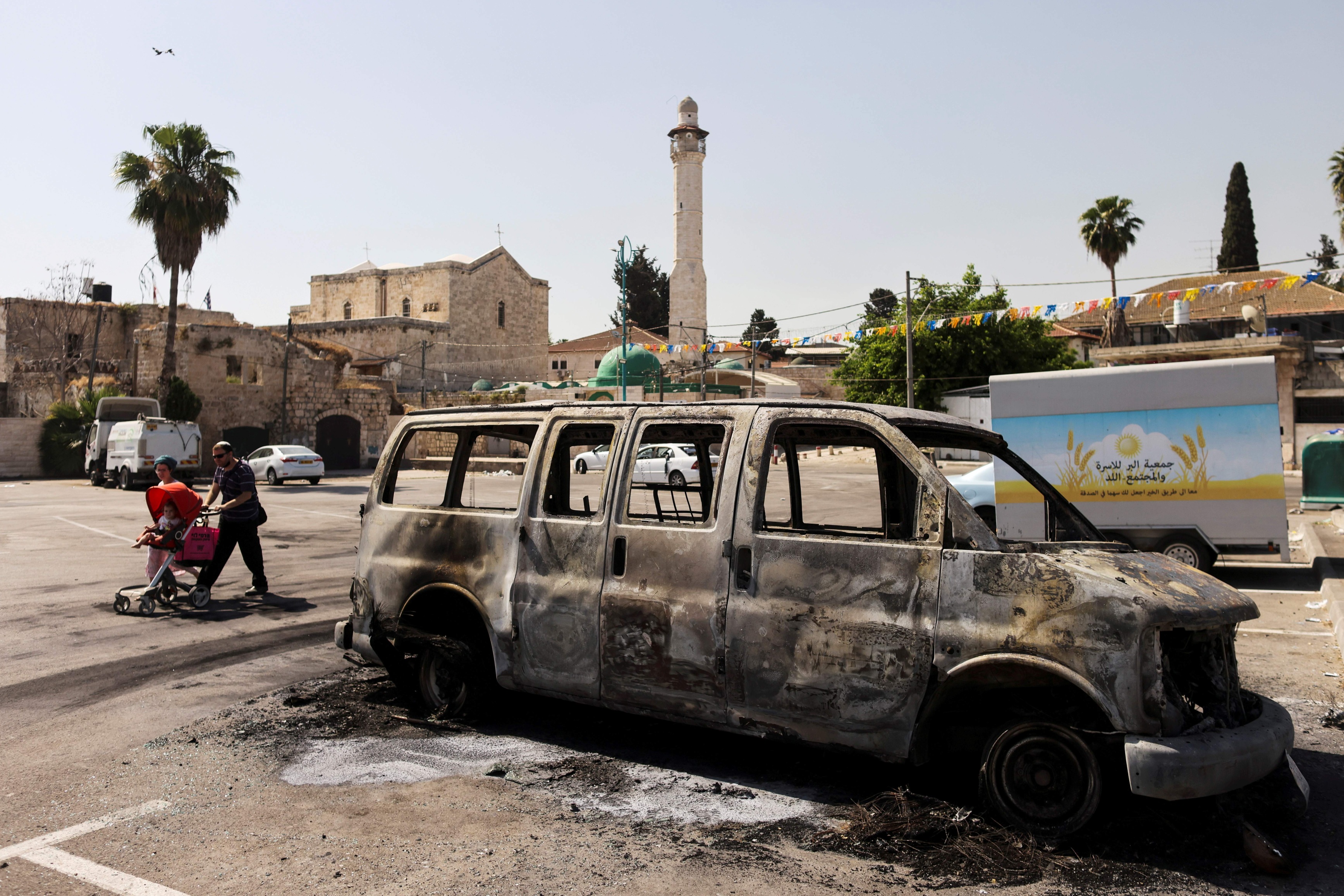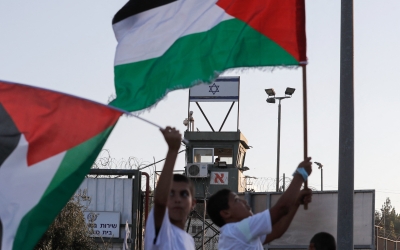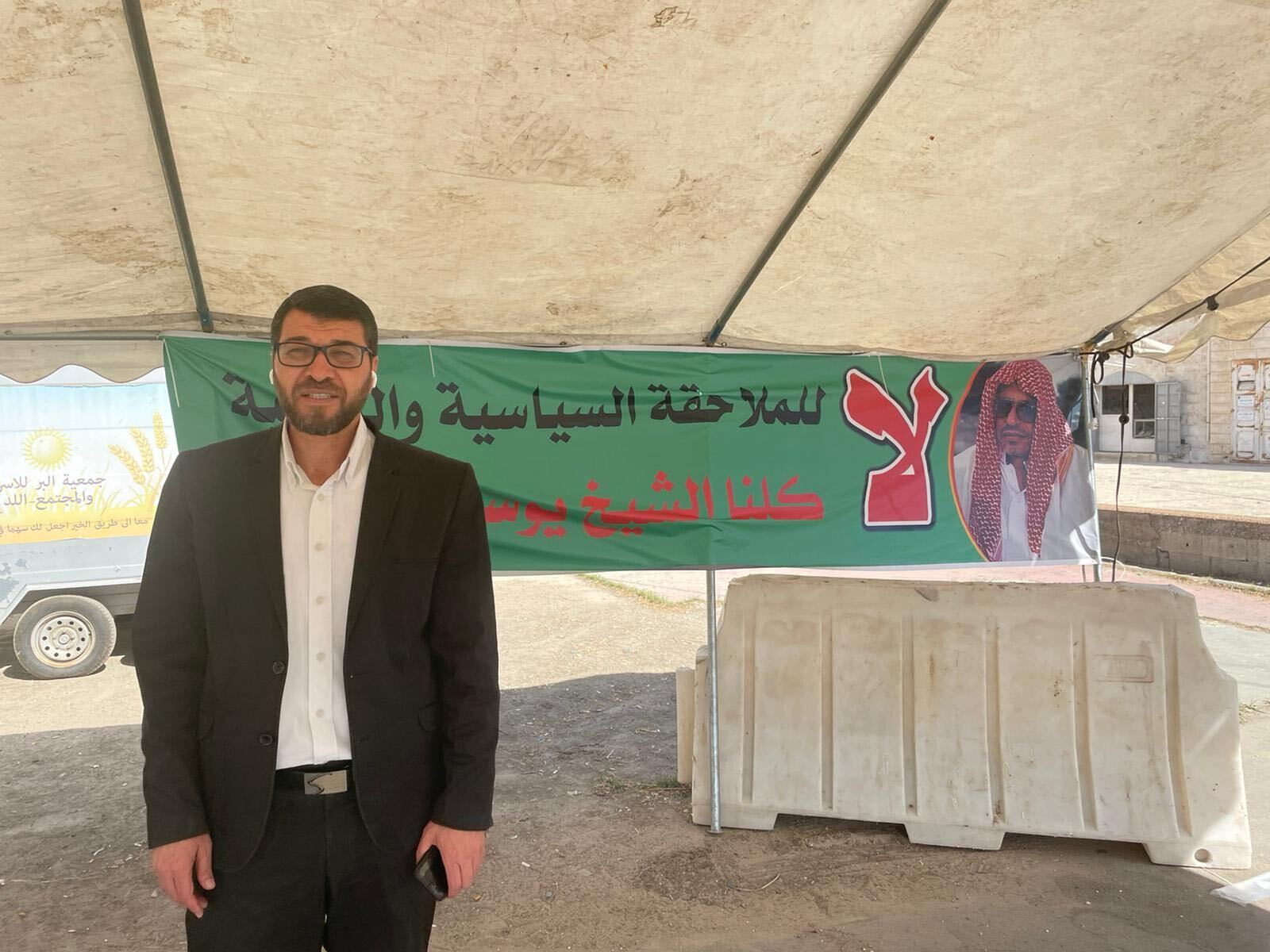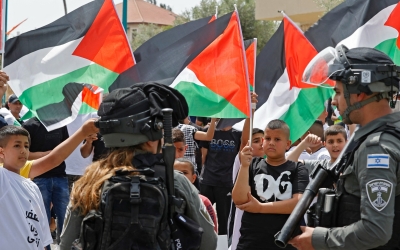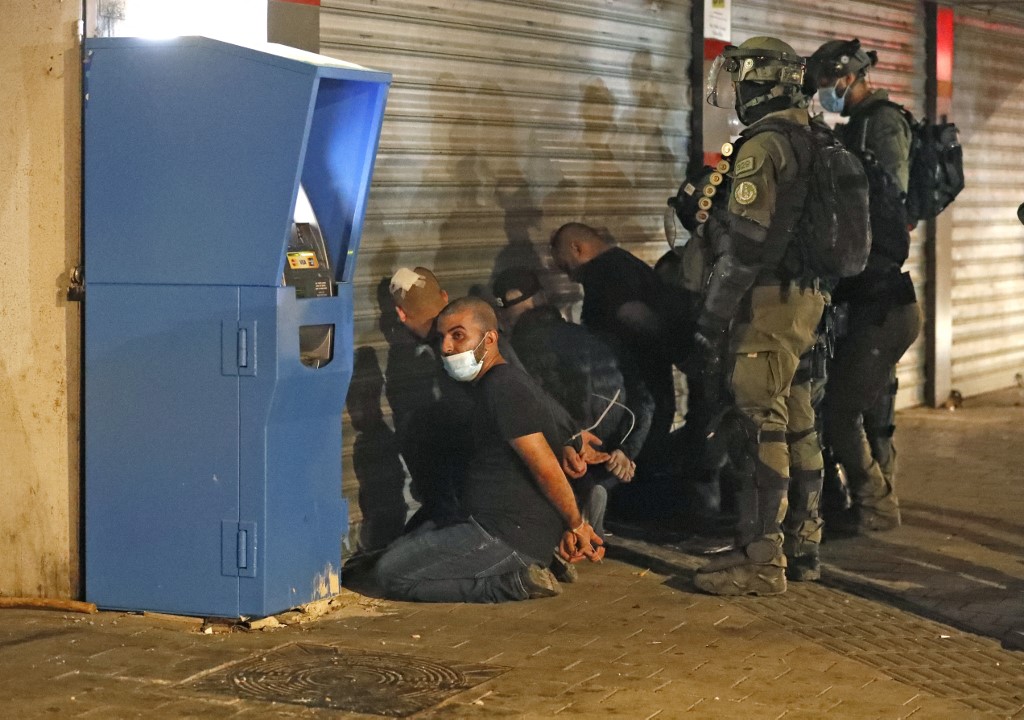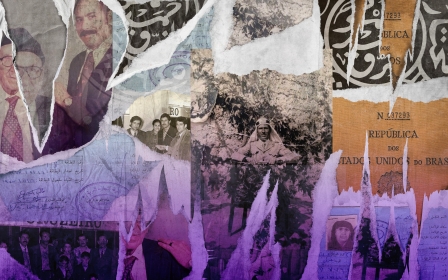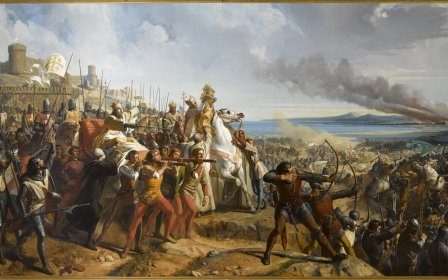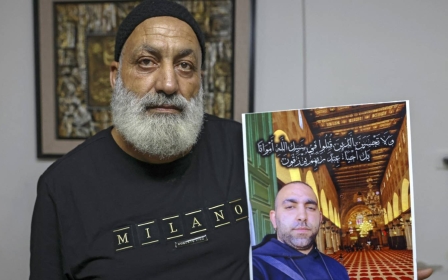Israel: Arrest of Palestinian imam in Lydd reopens city's unhealed wounds
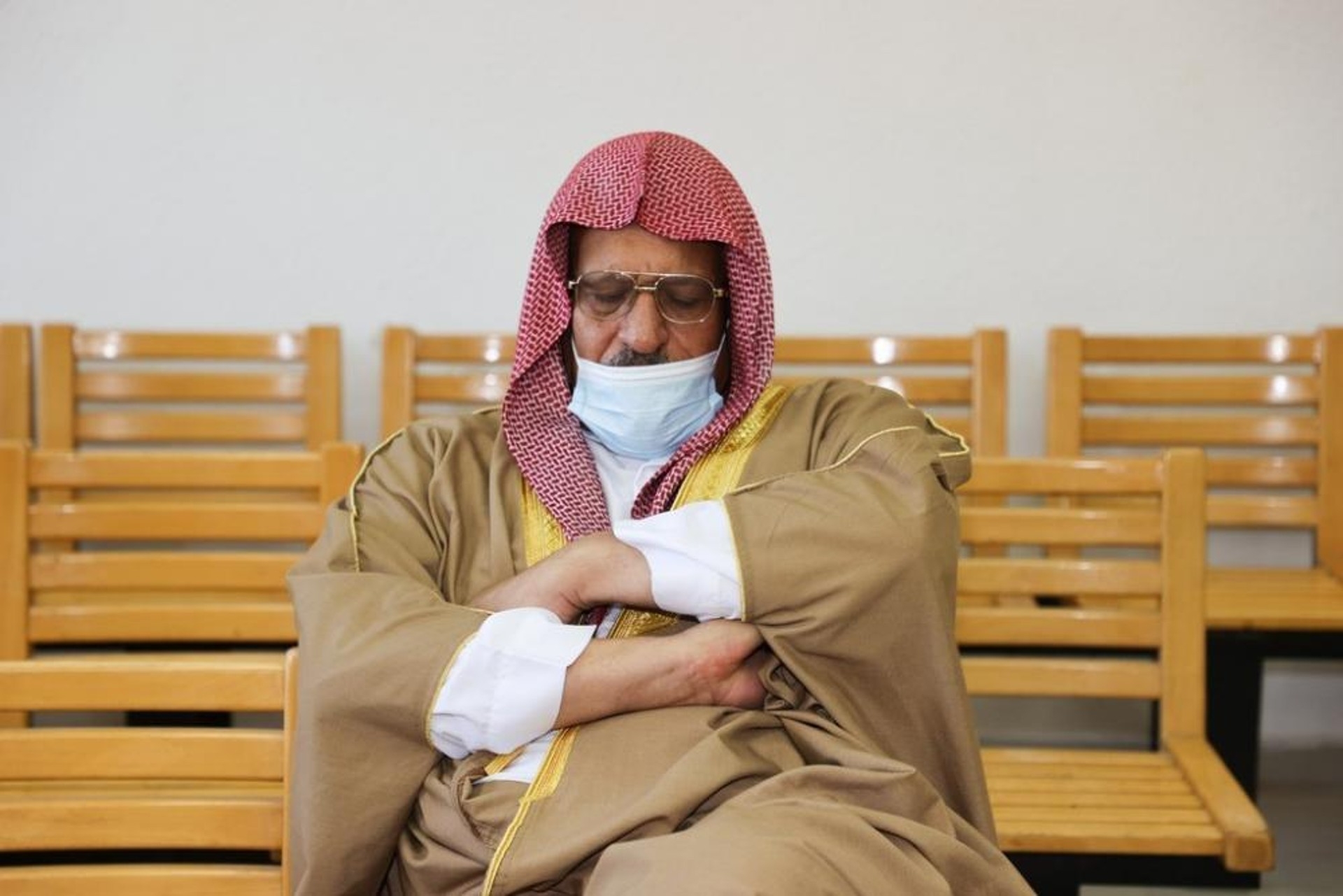
The scene of burnt-out cars, smoky air and warning pleas ringing out of the mosque's loudspeakers are still fresh in the minds of the Palestinian population of Lydd.
The central Israeli city, also known as Lod, witnessed some of the worst violence in May last year during inter-communal unrest that rocked the country.
Most of the riots in the city happened in the yards outside the Great Omari Mosque in the city's ancient old town.
The green-domed mosque is now the site of another struggle for the city's Palestinians.
The arrest of the mosque's senior imam, Shaikh Yusuf al-Baz - who has been detained for nearly four months on alleged charges of incitement - has reignited old fears of persecution for the minority community.
New MEE newsletter: Jerusalem Dispatch
Sign up to get the latest insights and analysis on Israel-Palestine, alongside Turkey Unpacked and other MEE newsletters
Outside the mosque, a solidarity tent has been erected where the violent riots last year took place, to fight what Palestinians say is a systemic clampdown against them that has not stopped since last year.
'He is detained unjustly, they are just targeting the influential community leaders in a psychological war with the Palestinian people'
- Yusuf al-Baz's daughter
"He has done nothing wrong and committed no crime," Anhar al-Baz, the imam's daughter, told Middle East Eye.
"He is detained unjustly; they are just targeting the influential community leaders in a psychological war with the Palestinian people.
"They want us to stop expressing our opinions, which is our most basic human right."
Al-Baz, who has served as a teacher and mosque leader for more than 30 years, was arrested on 30 April and later charged with incitement to violence, an accusation that he strongly denies.
As the legal proceedings drag on in court, frustration builds up for Lydd's Palestinians.
Earlier this month, the court refused to release him on bail awaiting trial, which now seems to have awakened the pain of unhealed wounds from last May's unrest for the city's Palestinians.
In 11 days of violent mob attacks and police crackdowns, two Palestinian citizens of Israel were killed, including Lydd-native Moussa Hassouna, whose house is metres away from the Omari mosque. One Jewish man, Yigal Yehoshua, also died in the violence after being struck in the head with a brick while driving in his car.
Since then, Israeli authorities have carried out sweeping arrests and interrogations of Palestinians.
For many, the arrest of al-Baz, a well-respected community leader, was a step too far.
Despite the peaceful tone in the solidarity tent, a tense atmosphere still lingers.
"There is a fire in the air waiting to be lit up," warned Akram Saqallah, who is a member of Lydd municipality and the city's Palestinian popular committee, which organised the tent.
"There's a spark waiting to explode at any moment."
Population control
Lydd, located around 25km to the east of Tel Aviv and about 50km to the northwest of Jerusalem, is one of several cities with a mixed Jewish-Palestinian population.
Palestinians have lived in what are often referred to as mixed, or binational cities - such as Haifa, Acre, and Jaffa - for generations.
Most belong to communities that were either internally displaced or stayed in their homes during the 1948 war known to Palestinians as the Nakba, or "catastrophe".
In a months-long military campaign, Zionist paramilitaries detroyed 500 villages and forcibly expelled 750,000 Palestinians from their homeland to make way for the creation of Israel in May 1948.
The population of Lydd today is about 80,000 people, nearly a third of them Palestinians.
For the past two decades, the city, like many other binational cities, has been targeted by a movement of settler groups on a mission to increase the Jewish population and prevent Palestinian majorities.
The effort is led mainly by the Garin Torani (literally Torah Nucleus or "biblical seeds"), a hardline Zionist movement that has been encouraging families to move to mixed cities and facilitating development projects for Jewish residents there.
Mass resettlement to Lydd occurred in 2005 when most of the Israelis living in the evacuated Gaza Strip settlements moved to the city and their population and influence began to grow.
The group's projects have received the support of city officials, including mayor Yair Revivo, who in 2017 stormed into a mosque to stop the broadcasting of Eid prayers through loudspeakers.
Simmering tensions
Years of pent-up tensions exploded in May 2021, as mass protests engulfed Palestine and Israel against the police storming of al-Aqsa Mosque and army bombardment of the Gaza Strip.
What started as solidarity protests outside the Omari mosque over settlers' incursions at Al-Aqsa, the forced evictions at Sheikh Jarrah, and the bombing of Gaza quickly descended into inter-communal unrest as ultra-nationalist Israelis roamed the streets of the city, attacking Palestinian neighbourhoods.
On the first night of the ensuing communal clashes, Hassouna, 32, was shot dead by four Israelis.
In the following four days, Israeli ultra-nationalists, some armed and in full view of police, continued to attack the mosque as synagogues were torched in retaliation.
In the aftermath of the 11-day unrest, in which police seemed to lose control of the streets, hundreds of Palestinian citizens were rounded up in a mass arrest campaign.
To this day, interrogations are still ongoing and near-daily, according to lawyer Khaled Zabarqa, who is representing al-Baz.
Therefore, the arrest should not be separated from this context, the attorney said.
"[The arrest] may be part of the effort to clamp down on the Palestinians in the aftermath of the events of May 2021," Zabarqa told MEE.
"But more importantly, it's probably part of a dangerous policy being undertaken by the state to dilute the awareness of Palestinian citizens in Israel [of their national struggle]."
'Political revenge'
Al-Baz is no stranger to run-ins with Israeli police.
The passionate preacher, who is affiliated with the now-outlawed northern branch of the Islamic Movement in Israel, has long been a vocal advocate for Palestinian rights.
He has been detained in the past for his activism, but none of those stints in jail have been as serious as the current imprisonment, according to Zabarqa.
He was arrested on 30 April amid daily raids by Israeli forces and settlers into al-Aqsa Mosque during the month of Ramadan.
On 10 May, one year after the violent events of 2021, al-Baz was charged with incitement over remarks in which he celebrated Palestinians who "defend" Al-Aqsa Mosque.
He was accused of "inciting against the security forces and supporting violent disturbances of order," a charge which he refutes.
'This is political revenge for al-Baz's strong and clear political rhetoric, especially on the protection of Palestinian sanctities and identity'
- Khaled Zabarqa, al-Baz's lawyer
"He just expressed his opinion in defence of al-Aqsa Mosque and worshippers in it through a Facebook post. There was no incitement," his daughter Anhar told MEE.
"It's clear that this is part of a psychological war that authorities are launching against him. They want to make an example out of him."
The prosecution requested that al-Baz be kept in detention during the legal proceedings, which was upheld by the central district court on 10 August after an appeal was filed by his defence.
Zabarqa said he was surprised by the decision to keep him in detention, as he posed no real threat.
"This is political revenge for al-Baz's strong and clear political rhetoric, especially on the protection of Palestinian sanctities and identity, as well as his position on certain issues affecting Palestinian citizens of Isreal," Zabarqa added.
Solidarity
The decision to extend his pre-trial detention prompted al-Baz to launch a hunger strike in protest.
But the health of the 64-year-old, who already suffers from heart disease, quickly worsened and he was transferred to Soroka Medical Center, which sparked protests by his supporters.
"What they don't know is how much support my father has in the city," Anhar said. "He is one of the city's most respected elders and he has long played a role in solving disputes between people.
"The state thinks by putting him in jail they'll make an example out of him to deter the younger generation. But the opposite is happening, his arrest is only making them more aware of what they are up against."
With no end in sight to his ordeal, a committee was formed to sustain pressure on authorities to release him, at least until the trials.
A solidarity tent was put up outside the Omari mosque, with lectures and social events inviting more supporters in.
The ailing preacher was later convinced by his family and lawyers to stop the hunger strike, which they said was seriously endangering his life.
But the protests continue with plans to launch a regional demonstration if the committee's demands are not met, according to Saqallah, one of the organisers.
"At first we thought it would be a matter of weeks before he would be released. But now it's been over three months and we are realising there is a bigger goal at play here," Saqallah told MEE.
"He's an icon in the community, and they know he's an icon. They want to deter the Palestinians in Lydd through [his arrest]."
'Discriminatory responses'
Evidence of accusations that Israeli authorities have been disproportionately singling out Palestinians since 2021 has been documented by many NGOs, inside and outside Israel.
A month after the violent May events, Amnesty International said Israeli forces carried out a "discriminatory repressive campaign" against Palestinians in Israel in Jerusalem, targeting them with "arrests, torture and unlawful force" during and after the riots.
The London-based rights group also said police "failed to protect Palestinian citizens of Israel from premeditated attacks by groups of armed Jewish supremacists, even when plans were publicised in advance and police knew or should have known of them."
The findings, based on witness testimonies and verified videos, were echoed in a similar report released by Human Rights Watch (HRW) in December.
"At times the police appeared to react half-heartedly and unevenly to violence against Palestinian citizens of Israel committed by Jewish ultra-nationalists," HRW said.
"Public statements by senior Israeli officials appeared to encourage discriminatory responses by authorities and the judiciary," it added.
Earlier this month, a study by the Israel Religious Action Center (IRAC) revealed that Palestinian citizens of Israel received a significantly higher number of indictments, convictions and sentences for incitement to violence than their Jewish peers in the last eight years.
Between 2014 and 2021, 77 percent of all indictments for incitement to violence and racism were filed against Palestinian citizens of Israel, who make up only 20 percent of the country's population.
The figures represented "insufficient enforcement policy", the Jerusalem-based group said.
Authored by attorneys Ori Narov and Orly Erez-Likhovski, the IRAC report said the lack of indictments against rabbis allegedly inciting violence, compared with Muslim clerics, demonstrates the law is not applied equally in the country.
The law enforcement system suffers from "a long, thunderous silence about the wild, unbridled incitement of rabbis who pretend to base themselves on Jewish law", it said.
The campaign against Palestinian citizens of Israel, dubbed "Law and Order" by police, was launched on 24 May 2021, days after the 11-day hostilities ended.
By 10 June, Israel arrested more than 2,150 people, 91 percent of whom were Palestinian citizens of Israel.
Janan Abdu, a Haifa-based lawyer who represented some of the detainees in these trials, said several rights were violated in the ongoing campaign.
These include "confiscation of personal cellular phones; assaulting journalists and activists who were filming and documenting attacks; kidnapping of children by special forces of undercover teams; using excessive force during arrests and transfers to detention centres; inhumane prison conditions; and postponing urgent medical treatment for detainees until taking their statements."
'Lydd before [10 May 2021] is not like Lydd after it'
- Akram Saqallah, municipality member
In the Lydd-Ramle area alone, at least 300 people were arrested including 15 who are still detained, according to Zabarqa.
Meanwhile, no one has been charged for the murder of Hassouna, who was shot dead by four Israelis, after police closed the investigation into his killing saying the suspects opened fire in "self-defence".
That's why for many in Lydd the arrest of al-Baz is only the tip of the iceberg, Saqallah believes, and the solidarity tent outside the mosque is about more than just a call for his release.
"After 10 May, their true colours came out. Lydd before that day is not like Lydd after it," he warned. "They want to scare the youth by arresting the sheikh but they don't know us and the sheikh very well.
"Our roots are deep in this land. The people of Lydd die where they're born. We will never leave it."
Middle East Eye delivers independent and unrivalled coverage and analysis of the Middle East, North Africa and beyond. To learn more about republishing this content and the associated fees, please fill out this form. More about MEE can be found here.


